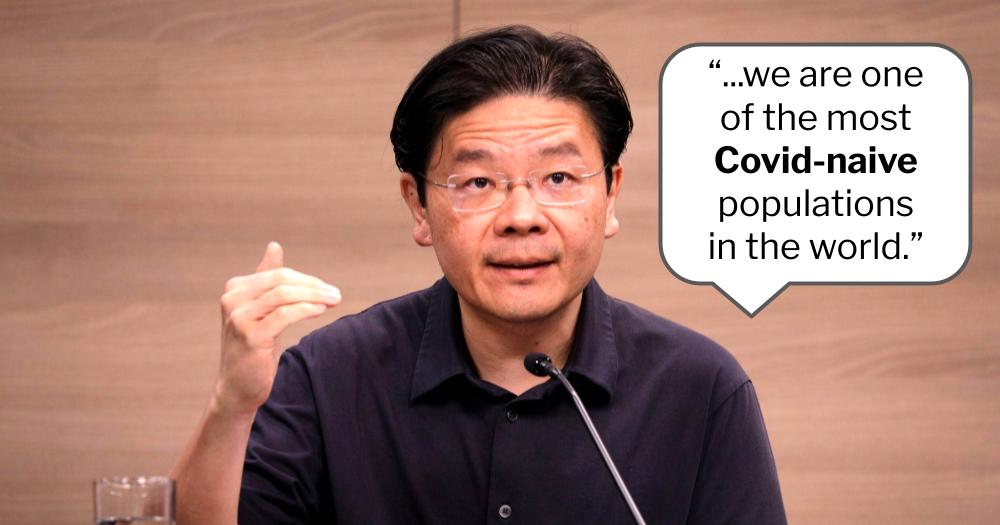Follow us on Telegram for the latest updates: https://t.me/mothershipsg
At the recent Multi-Ministry Taskforce (MTF) press conference on Oct. 2, finance minister and MTF co-chair Lawrence Wong called Singapore's population "one of the most Covid-naive populations in the world".
Wong said this in his opening remarks at the press conference, while giving an update on the overall Covid-19 situation in Singapore.
He mentioned that particular phrase while explaining that Singapore's overall strategy to reopening — geared toward living with Covid-19 as an endemic disease, rather than trying to eliminate it altogether — has not changed.
He explained that new restrictions were put in place as part of what the MTF has called the "stabilisation phase", because of "tremendous stresses on our healthcare system" and said that procedures and protocols would need "a little bit of time", which is why the recent restrictions were imposed.
Wong then said that Singapore should be prepared that the current big wave of cases we are experiencing will not be the last.
The reason why we should expect more waves of cases in future?
"We are one of the most Covid-naive populations in the world," he said, before comparing Singapore's experience to that of "many European countries" — though he did not mention which ones in particular.
What it means to be "Covid-naive"
To be naive typically means to be inexperienced or innocent, perhaps even gullible.
Surely Wong would know better than to call Singaporeans naive, you might be thinking.
However, there is another different meaning of "naive" in the medical field — specifically, when one is talking about drugs, or a person's immune system.
In other words, to be naive to the Covid-19 virus simply means that these individuals are "not previously infected", as clarified in a World Health Organisation (WHO) scientific brief on Covid-19 natural immunity.
Why should Covid-naive Singapore expect future waves of cases?
As Wong went on to explain, some countries in Europe are not as Covid-naive as Singapore.
This means that a larger proportion of their populations had been previously infected with Covid-19.
Wong explained that those countries had high fatalities when they went through their waves of Covid-19 infection in the past year or so, prior to vaccines being rolled out.
These high fatalities were the "high price" that these countries paid for a higher level of natural immunity — that is, immunity from being infected with Covid-19, as opposed to immunity from getting vaccinated.
This natural immunity, as well as successful vaccination programmes, means that many of these countries now have "a new Covid-stable situation", Wong explained.
Such countries have been able to relax restrictions, while avoiding a resurgence of cases.
In Singapore, on the other hand, infections were kept low "for a very long time", Wong highlighted.
Here's a simple summary of the comparison that Wong made.
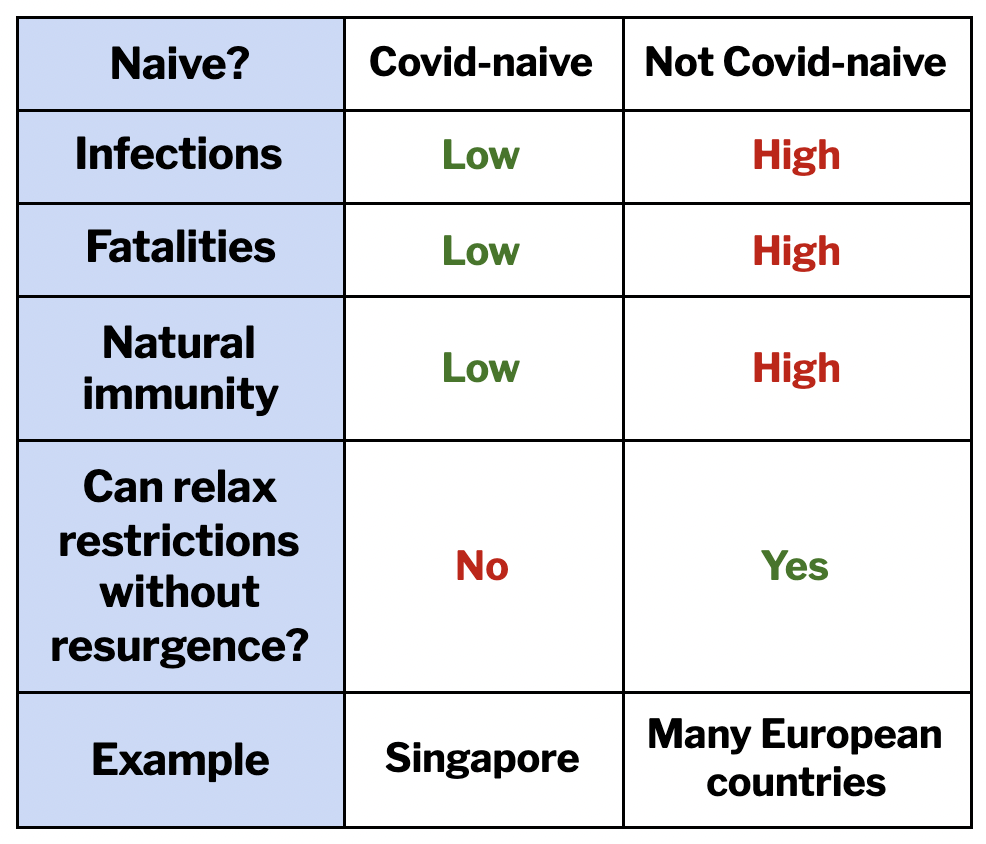
So is being Covid-naive a bad thing?
To Wong, Singapore is "fortunate" in many ways to be in a different position than our European counterparts.
Many of those countries experienced their waves of infections prior to, or while vaccines were being rolled out.
However, Singapore is experiencing its current wave of infections with high vaccination rates.
This means that most of Singapore's population will be protected against serious illness even if infected.
"That also means that we can get through this, and any subsequent waves with fewer casualties than the European countries," said Wong.
But does this mean permanent restrictions?
Wong said that Singapore will reach a point, "perhaps months later", where we will have high vaccinations and high natural immunity.
If you've been reading closely so far, you'd know that this means we would no longer be Covid-naive by then.
According to Wong, when this point arrives, Singapore will be "able to reopen more confidently without seeing a new wave of cases."
Ironically, however, Singapore will reach this point of high natural immunity more quickly if restrictions on social gatherings are relaxed, or even removed.
However, this would come at the expense of the healthcare system, as a surge in infections would not only result in reduced capacity to treat Covid-19 patients with severe symptoms, as well as those with other non-Covid-19 illnesses.
Thus, the relevance of something you might find familiar from the early days of the pandemic: Flattening the curve.
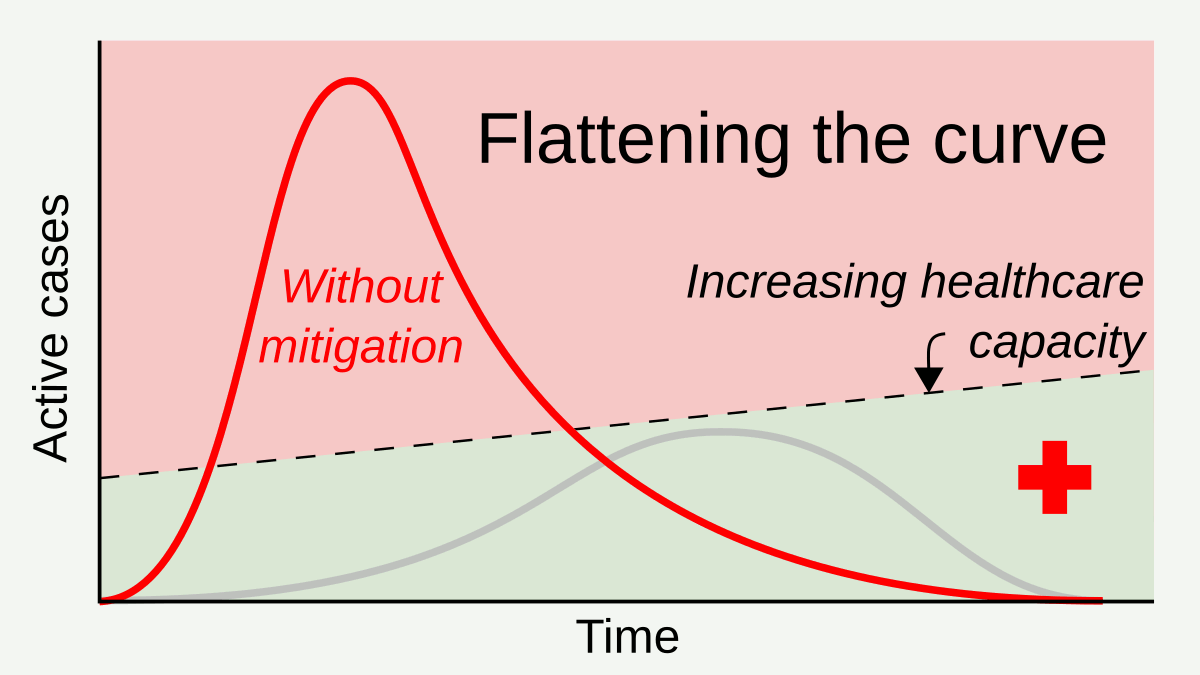 Image via Wikimedia Commons by Wikipedia user RCraig09 / CC BY-SA 4.0
Image via Wikimedia Commons by Wikipedia user RCraig09 / CC BY-SA 4.0
Are we still Covid-naive even with almost-85% vaccinated?
Some might be wondering why past infection rates even matter, since after all, Singapore's Covid-naive population also happens to be one of the most highly vaccinated in the world.
However, the past infection rates could make a significant difference, as past infection along with vaccination has been said to produce the "best protection" against Covid-19 and its variants.
In many other countries, big waves of infections followed by vaccination meant that significant segments of their population have both natural immunity, and immunity from vaccination — with this outcome having come at the cost of many deaths, and in some cases, an overburdened healthcare system.
In Singapore, lots of us have the vaccine, but no past infection to confer us with that "best protection", which makes us Covid-naive.
How Covid-naive are we, actually?
How do Singapore's infections compare to other countries' rates?
Are we in fact — in Wong's words — "one of the most Covid-naive populations in the world"?
Here's a comparison of infection and fatality rates in Singapore (in red), some of the countries that Wong may have been referring to, as well as some countries closer to home, as of Oct. 1, 2021:
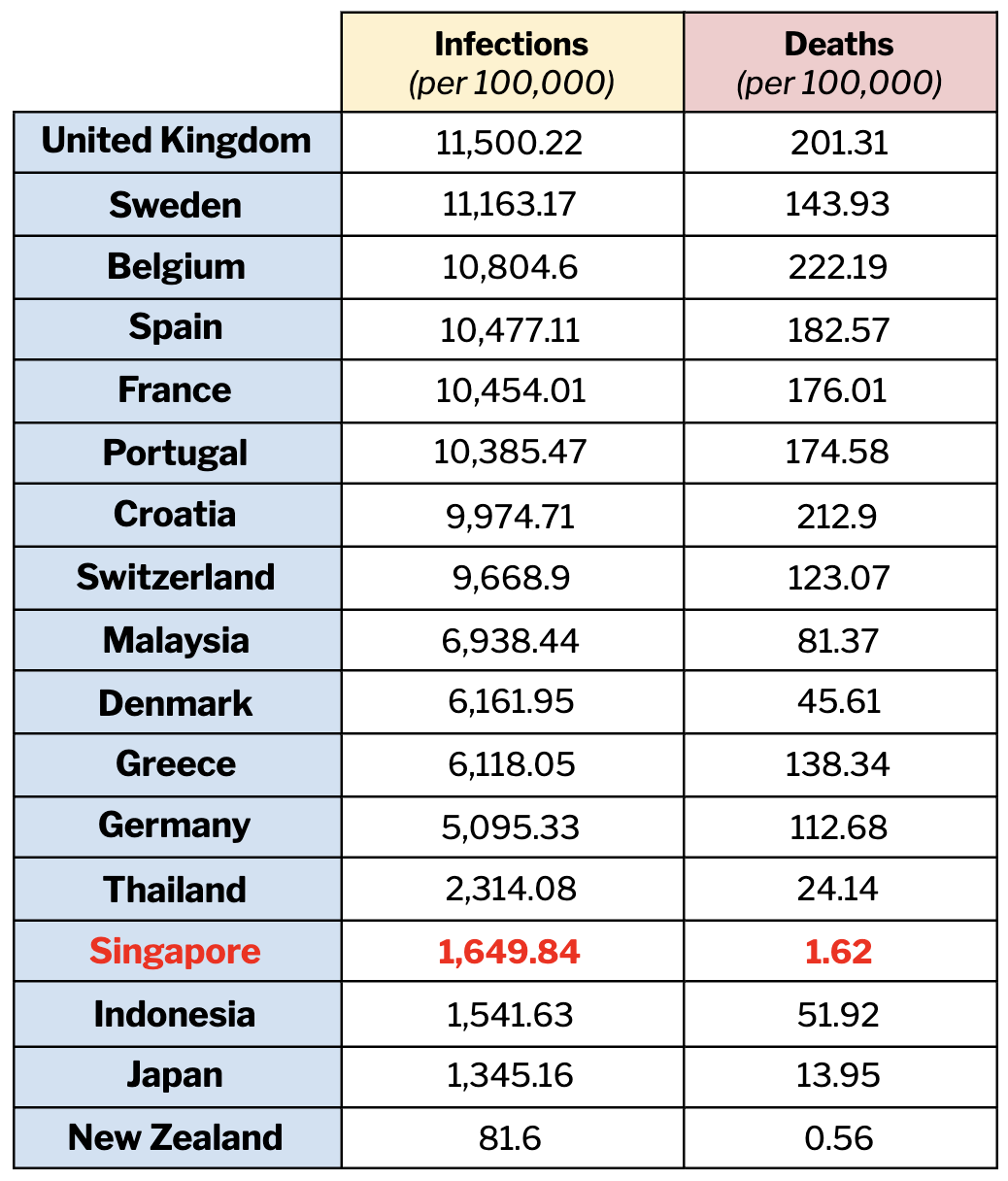 Data from the World Health Organisation (WHO)’s Coronavirus (Covid-19) Dashboard.
Data from the World Health Organisation (WHO)’s Coronavirus (Covid-19) Dashboard.
Singapore ranks 98th of 238 on the WHO's list, when countries/territories are ranked from least infections per 100,000 to most infections:
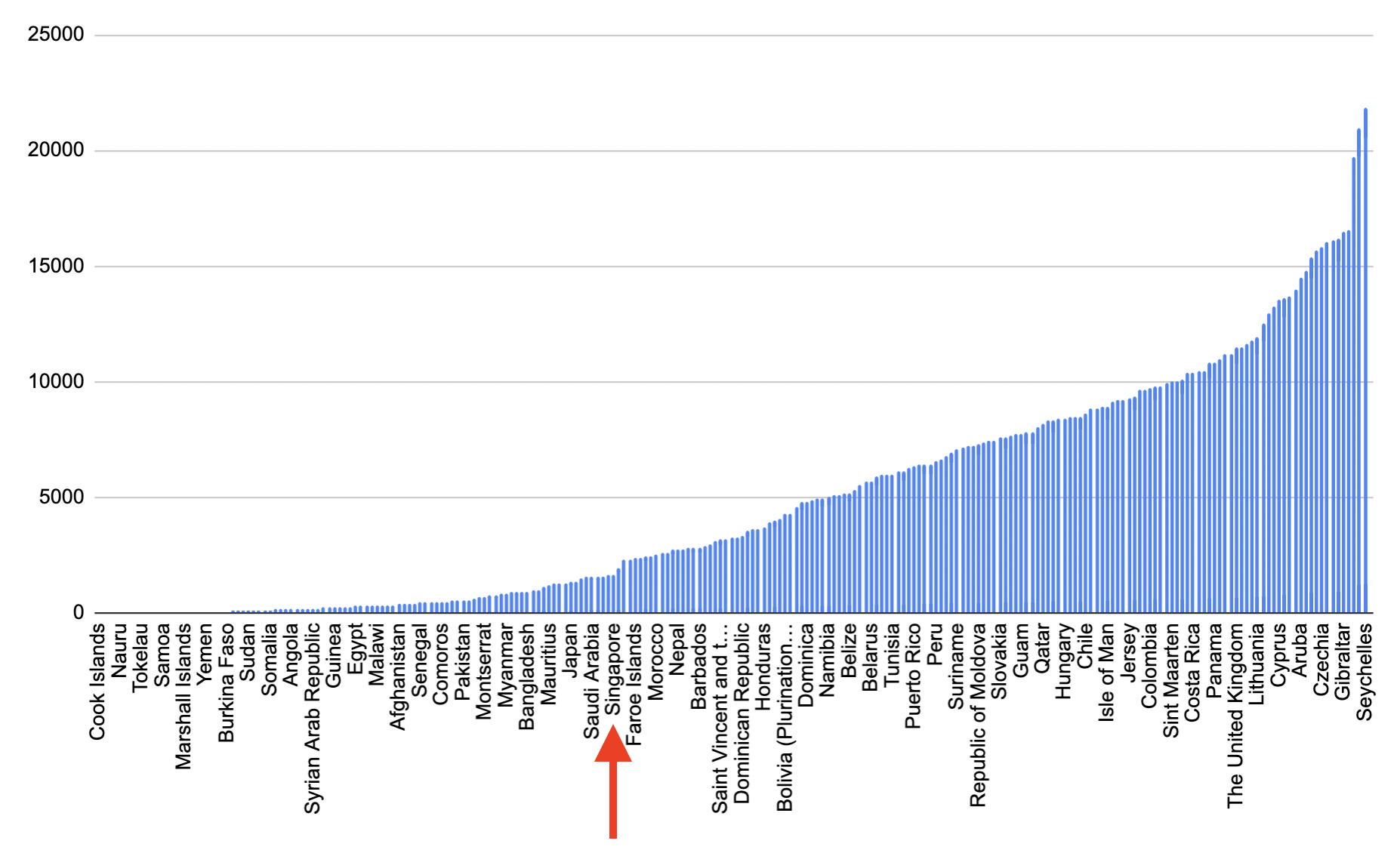
Singapore does better, however, if we are ranking countries from those which saw the lowest fatalities per 100,000, placing 40th in WHO's list:
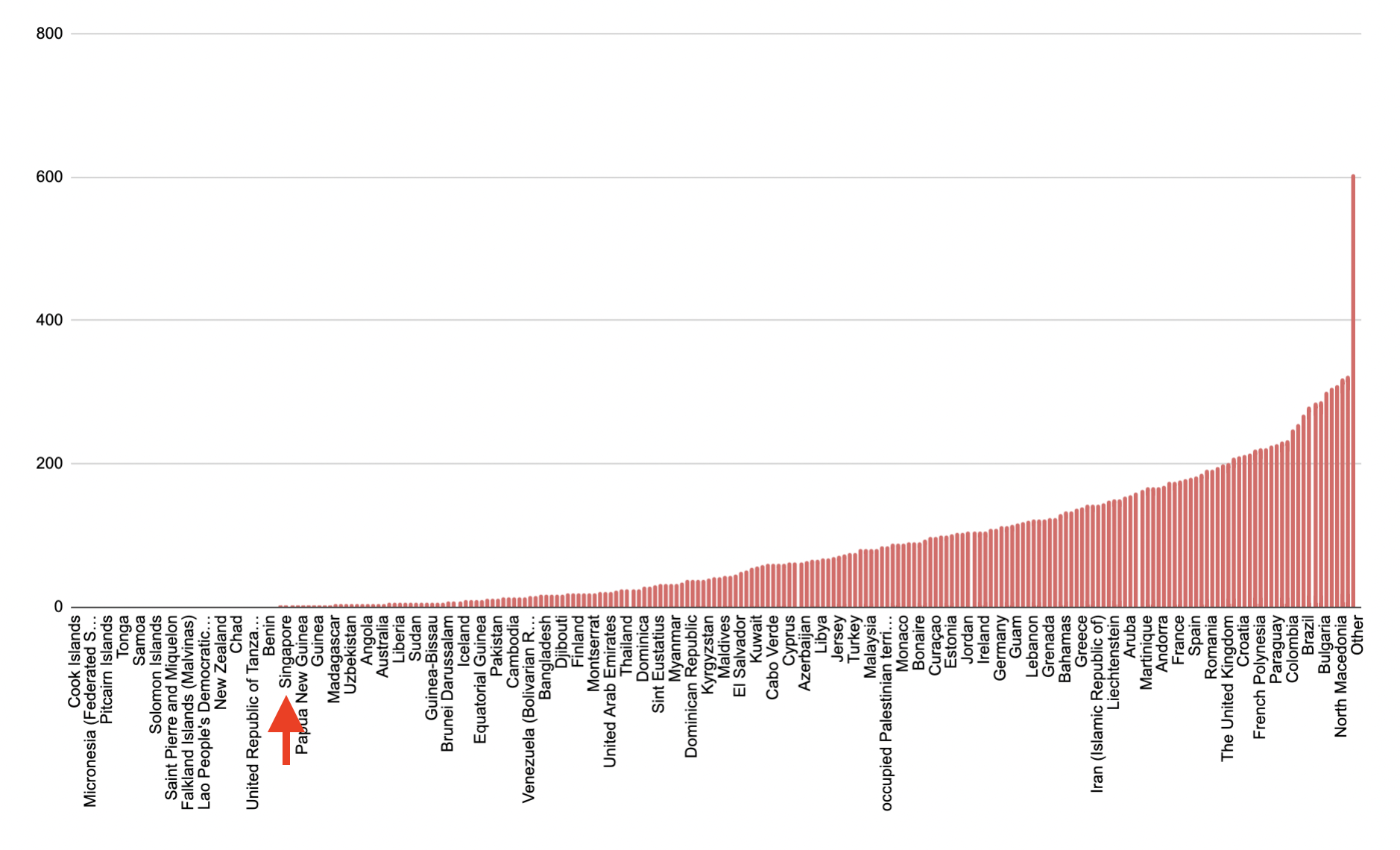
It's important to note that the data is only accurate to the extent that countries are able to detect and report cases, of course.
It would be useful to bear in mind, however, that Singapore has conducted extensive testing operations whenever Covid-19 cases spiked, as well as for all close contacts of positive cases, meaning that the numbers are not likely to be seriously under-reported.
Singapore has also continued to insist on testing widely, with Wong's fellow MTF co-chair and health minister Ong Ye Kung explaining that Singapore would continue its practice of testing even asymptomatic cases, at the same Oct. 2 press conference.
Also, the data is only updated till Oct. 1, 2021, and the additional days since then could well push Singapore's infection and death rates higher than what the WHO data currently shows.
That being said, the fact that we are seeing unprecedented numbers now means that we are moving further and further from being Covid-naive.
But this also means that we are on the path to natural immunity, and closer to the lifting of restrictions and "normal" life, as far as possible.
More of what Wong actually said
If you want to read more, here's the fuller context of what Wong said:
"Our overall strategy to reopening has not changed. But this is the first time we are experiencing such a big wave, and it is causing tremendous stresses on our healthcare system and our healthcare workers. Procedures, protocols have to be changed and adjusted, new capacity has to be added into the system. All these take a little bit of time, and that is why we are putting in place these measures in the stabilisation phase so that we can get all these things ready.
Even as we go about this exercise during this period, this week and over the next few weeks, I think we should also be prepared that this will not be the last wave we experience. We are riding one major, one big wave now, but we should be mentally prepared that there will be subsequent waves to follow. Why is that so? It is because we are one of the most Covid-naive populations in the world. Unlike for example, many other European countries, we have kept infections in Singapore low for a very long time.
Many European countries experienced large waves last year. If you recall, they went through these waves before they had the chance for their people to be vaccinated, and many countries ended up paying a high price, suffering high fatalities because of the waves that they experienced last year. But now, they have a much higher level of natural immunity, and together with the vaccination programmes that they have introduced, many of these countries have reached a new Covid-stable situation where they are able to resume activities and they have not seen any resurgence of cases.
We are in a different position. In many ways, we are fortunate because we are facing this wave now with a much more highly vaccinated population, and that means that the vast majority of our people will be protected against serious illness. That also means that we can get through this, and any subsequent waves with fewer casualties than the European countries. Eventually, we will reach a point with high vaccinations and with a higher level of natural immunity, we too will eventually reach a point, perhaps months later, where we are more similar to the European countries, and the Covid-19 situation stabilises, and we are able to reopen more confidently without seeing a new wave of cases."
Related stories:
Top photo via MCI
Follow and listen to our podcast here
If you like what you read, follow us on Facebook, Instagram, Twitter and Telegram to get the latest updates.
